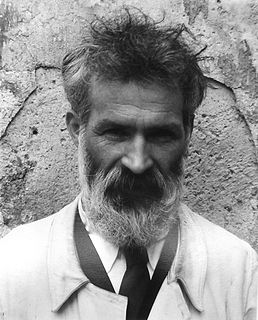A Quote by Arthur Schopenhauer
A man's knowledge may be said to be mature, in other words, when it has reached the most complete state of perfection to which he, as an individual, is capable of bringing it, when an exact correspondence is established between the whole of his abstract ideas and the things he has actually perceived for himself. His will mean that each of his abstract ideas rests, directly or indirectly, upon a basis of observation, which alone endows it with any real value; and also that he is able to place every observation he makes under the right abstract idea which belongs to it.
Quote Topics
Able
Abstract
Actually
Alone
Also
Any
Basis
Belongs
Between
Bringing
Capable
Complete
Correspondence
Directly
Each
Established
Every
Exact
Himself
His
Idea
Ideas
In Other Words
Indirectly
Individual
Knowledge
Makes
Man
Mature
May
Mean
Most
Observation
Other
Perceived
Perfection
Place
Reached
Real
Real Value
Rests
Right
Said
State
Things
Value
Which
Whole
Will
Words
Related Quotes
As man reaches out toward the twenty-first century, he will learn to be suspicious of all ideas that are not formulated so that they can be tested by observation. He will realize that the history of human thought shows that the ideas of which we are surest are the ones we most need to test. He will realize that his common sense only mirrors his training and experience. What seems natural and right to him is usually a reflection of the conditions under which he spent his first decade of life.
His (Lenin's)humanitarianism was a very abstract passion. It embraced humanity in general but he seems to have had little love for, or even interest in, humanity in particular. He saw the people with whom he dealt, his comrades, not as individuals but as receptacles for his ideas. On that basis, and no other, they were judged. He judged man not by their moral qualities but by their views, or rather the degree to which they accepted his.
Reason cannot desire for man any condition other than that in which not only every individual enjoys the most absolute, unbounded freedom to develop himself out of himself, in true individuality, but in which physical nature, as well, need receive no other shaping by human hands than that which is given to her voluntarily by each individual, according to the measure of his wants and his inclinations, restricted only by the limits of his energy and his rights.
How very seldom do you encounter in the world a man of great abilities, acquirements, experience, who will unmask his mind, unbutton his brains, and pour forth in careless and picturesque phrase all the results of his studies and observation; his knowledge of men, books, and nature. On the contrary, if a man has by any chance an original idea, he hoards it as if it were old gold; and rather avoids the subject with which he is most conversant, from fear that you may appropriate his best thoughts.
You perceive now, my friends, what your general or abstract duty is as teachers. Although you have to generate in your pupils a large stock of ideas, any one of which may be inhibitory, yet you must also see to it that no habitual hesitancy or paralysis of the will ensues, and that the pupil still retains his power of vigorous action.
Brutes abstract not. -- If it may be doubted, whether beasts compound and enlarge their ideas, that way, to any degree; this, I think, I may be positive in, that the power of abstracting is not at all in them; and that the having of general ideas is that which puts a perfect distinction betwixt man and brutes, and is an excellency which the faculties of brutes do by no means attain to.
The true value of the Christian religion rests, not upon speculative views of the Creator, which must necessarily be different in each individual, according to the extent of the knowledge of the finite being, who employs his own feeble powers in contemplating the infinite: but it rests upon those doctrines of kindness and benevolence which that religion claims and enforces, not merely in favour of man himself but of every creature susceptible of pain or of happiness.
The man who works recognizes his own product in the world that has actually been transformed by his work. He recognizes himself in it, he sees his own human reality in it he discovers and reveals to others the objective reality of his humanity of the originally abstract and purely subjective idea he has of himself
When needs and means become abstract in quality, abstraction is also a character of the reciprocal relation of individuals to oneanother. This abstract character, universality, is the character of being recognized and is the moment which makes concrete, i.e. social, the isolated and abstract needs and their ways and means of satisfaction.
Man is more than his environment. It is from the innate quality of the Spirit in him, his inner storehouse, that he draws those ideas, his intuitions, which unify his perceptions of the external world instantaneously with a value which is qualitative and not quantitative, and which he embodies in the works of his culture - those achievements which belong not only to one particular time but to all times, and mark the path of his upward progress.
All paintings start out of a mood, out of a relationship with things or people, out of a complete visual impression. To call this expression abstract seems to me often to confuse the issue. Abstract means literally to draw from or separate. In this sense every artist is abstract . . . a realistic or non-objective approach makes no difference. The result is what counts.








































